News Video
Social Democrat Alexandria Ocasio-Cortez Defends “Fake Black Accent” at Al Sharpton’s National Action Network Conference
NEW YORK – Justice Democrat and Socialist Congresswoman Alexandria Ocasio-Cortez has denied accusations she affected her accent when talking to a predominantly black audience at Al Sharpton’s National Action Network conference in New York City on Friday.
The freshman Democrat’s jarring accent was quickly criticized online by users who called the accent ‘fake’ and cringe-worthy. But AOC immediately hit back, defending it as authentic on Twitter.
‘Folks talking about my voice can step right off,’ she wrote on Twitter. ‘Any kid who grew up in a distinct linguistic culture & had to learn to navigate class enviros at school/work knows what’s up. My Spanish is the same way.’
‘As much as the right wants to distort & deflect, I am from the Bronx. I act & talk like it, *especially* when I’m fired up and especially when I’m home. It is so hurtful to see how every aspect of my life is weaponized against me, yet somehow asserted as false at the same time,’ she continued.
Ocasio-Cortez grew up in the Bronx until she was five, when her family purchased a home in Yorktown Heights in upstate Westchester County. She returned to the Bronx after graduating from Boston University in 2011.
‘Ain’t nothing wrong with that,’ the freshman Democrat drawled while speaking on Friday at Sharpton’s National Action Network conference in the Sheraton Times Square in Manhattan.
‘I’m proud to be a bartender. Ain’t nothing wrong with that,’ Ocasio-Cortez said. ‘There’s nothing wrong with working retail, folding clothes for other people to buy.’
Ocasio-Cortez used her platform at an Al Sharpton-sponsored conference in New York on Friday to call for the ‘examining and pursuing an agenda of reparations’ – among a list of other left-leaning policies including support for free public colleges
The speech sparked a fierce debate on Twitter over whether AOC is ‘real’.
Conservative pundits quickly pointed out the jarring accent that Ocasio-Cortez seemed to slip into repeatedly, which sounded halfway between Southern drawl and Boricua twang.
‘We’ve played a lot of clips of Alexandria Ocasio-Cortez, she doesn’t talk like that in a single one of them. That’s fake, that what that is,’ Fox News commentator Tucker Carlson said on his Friday show.
Other critics from the right took to Twitter to mock Ocasio-Cortez for her newfound accent.





‘I got five seconds into the video of AOC putting on an accent before cringing out,’ wrote Washington Free Beacon reporter Alex Griswold.
‘Ocasio-Cortez speaks in an accent that she never uses while telling a room of predominately black people that there is nothing wrong with them folding clothes, cooking, and driving other people around on a bus for a living,’ wrote Daily Wire reporter Ryan Saavedra.
‘She literally pulled a Hillary Clinton,’ he continued, referring to Clinton’s habit of slipping into Southern accents in front of certain audiences during her Senate campaign.
Congressional Candidate Aja Smith wrote: ‘@AOC it was an insult for you to try a FAKE southern accent to impress people in a crowd…you might as well put on black face!’
‘What’s with AOC changing her accent every time she goes to a new place to try and fit in? So fake’, another user added.

She was branded condescending by others, who wrote: ‘Congratulations I think your fake accent was better than Hillary’s – just a little condescending don’t you think to try immitate (sic) the way others speak?’
Another added: ‘@AOC mocks this African American audience by using an accent she thinks they ALL have. To Cortez, everything is about identity politics and every black person sounds like this. Shame.’
But others rushed to defend Ocasio-Cortez, saying: ‘I’m a Nigerian, black, educated lawyer. At any given time my accent goes every which way because how I talk w/ my parents, w/ my friends, & at work differs.
It’s a privilege/skill to even be able to codeswitch. Y’all can’t turn us against@AOC. Try again.’
‘Isnt she from the Bronx? Please correct my if I’m wrong but her accent sounds like a New York one. If you think thats “ghetto” Mark you need to get your head out of your ass’, another added.
Several commentators referenced code-switching, alternating between languages or varieties of language in conversation.
One said: ‘People who don’t understand the concept of code-switching and how it is part of the lives of people of color need to talk to more people.’
Another added: ‘It’s hilarious that white people think this is some kind of “gotcha!” for them to use against @AOC, when they don’t get that code-switching is something that virtually every professional person of color learns as a teenager. 20% of the black retail experience is specifically this.’
In February AOC was forced to insist that she does live in the Bronx, despite claims that her neighbors have never met her.
Through a spokesman, the New York Democrat strongly denied a report in the New York Post, which claimed there was scant evidence that she lives in the Bronx condo where she is registered to vote.
‘She lives there,’ the freshman congresswoman’s spokesman Corbin Trent told DailyMail.com, referring to a condo in the Parkchester neighborhood that was owned by Ocasio-Cortez’s late father.
‘That’s home, period, for her. That’s where she gets her energy, her drive. She not only lives there, that’s where her heart’s at, period,’ Trent said of the condo.
He said that he had worked for Ocasio-Cortez for two years, and personally knew that Ocasio-Cortez lived in the condo during that time.
Trent then said she actually lives ‘a block and a half away’ from the listed address in a two bedroom apartment with her boyfriend, having made the switch last month.
But Instagram clips then appeared to show she moved into new apartment in November – despite spokesman’s claims she settled in February.
In July, DailyMail.com reported that Ocasio-Cortez had actually spent much of her youth living in upscale Westchester County, in seeming contrast with a hard-luck campaign biography touting her Bronx roots.
After living in the Parkchester condo until she was around age five, her family moved to the suburban home for better schools, selling it when her father tragically died of cancer in 2008, but retaining ownership of the Bronx condo.
Earlier this week she revealed she still sleeps on a mattress on the floor of her unfurnished Washington apartment as she showed her followers around her home.
Others rushed to defend Ocasio-Cortez. Several commentators referenced code-switching, alternating between languages or varieties of language in conversation
At the event on Friday, Ocasio-Cortez used her speech to call for reparations to black Americans for slavery.
The freshman Democrat is pushing the controversial policy that has gained traction among the field of candidates bidding to oust President Donald Trump in the 2020 presidential election.
Ocasio-Cortez used her platform at an Al Sharpton-sponsored conference in New York on Friday to call for the ‘examining and pursuing an agenda of reparations’ – among a list of other left-leaning policies including support for free public colleges.

Speaking about her cornerstone Green New Deal, which would entail a radical government-led overhaul of the economy and energy usage, Ocasio-Cortez said she ‘would not shy away’ from bold decisions on health care, wages and prison reform.
‘That is the moral political and economic underpinning of making bold investments and dignified jobs because that is the necessary plan to fix the pipes in Flint [Michigan] and clean the air in the South Bronx,’ the rising political star said.
She went on to call for unionized energy jobs for transitioning workers in Appalachia and West Virginia, as well as single-payer health care and Medicare-for-all.
Adding: ‘Tuition-free public colleges and universities to prepare our nation for the future, and for the end of mass incarceration, the war on drugs, examining and pursuing an agenda of reparations and fixing the opioid crisis too.’
But an investor speaking at the same event has labelled Ocasio-Cortez ‘financially illiterate’ for her role in destroying the Amazon deal which saw the retail giant pull out of New York.
Tracy Maitland, president and chief investment officer of Advent Capital Management, said: ‘The people campaigning against the Amazon campus are financially illiterate.’
He later told The New York Post: ‘This was a disgrace. I partially blame AOC for the loss of Amazon. She doesn’t know what she doesn’t know. That’s scary.
‘We have to make sure she’s better educated or vote her out of office.’
CUNY chairman Bill Thompson also said the pull out meant job opportunities were ‘snatched away’ from students of the City University.
Ocasio-Cortez said the policies she had in mind were generational rather than geared around a presidential cycle.
The recently sworn-in Congresswoman’s support of progressive policies highlights a shift further left by the Democratic Party, whose leading figures in the past – including Barack Obama, Hillary Clinton and Bernie Sanders – all came out against it.
It remains unclear how the reparations would be delivered, however.
Rep. Sheila Jackson Lee, who introduced a bill on the subject in January, said that ‘the impact of slavery and its vestiges continues to affect African Americans and indeed all Americans in communities throughout our nation.’
She said the measure, formally known as the ‘Commission to Study and Develop Reparations Proposals for African Americans Act’, would examine the ‘institution of slavery in the colonies and the United States from 1619 to the present, and further recommend appropriate remedies.’

News Video
China’s Growing Interest in Equestrian Sports and Lifestyle

SHANGHAI – Leather riding boots are neatly lined up on a carpet, a picture shows blood-thirsty hounds on a fox hunt and a fountain spews water from the mouths of stone horses. It may have the trappings of upper-class Britain, but this is in fact suburban Shanghai and the County Down Club, the self-styled first exclusive membership club in China for horsemanship and fox-hunting.
The club, which takes its name from a county in Northern Ireland, was founded three years ago and owner Steven Sun says equestrian sport “has developed rapidly in China during the past five to 10 years”.
“I think it’s a change in awareness,” said the 32-year-old, whose interest in horses was triggered while studying in Britain.
Rising numbers of people in China are taking up sports such as horse riding as the country’s growing economy — now the second biggest after the United States — gives people more disposable income to pursue leisure activities.
County Down has a dozen horses and Sun wants it to be at the forefront of promoting equestrian sports in China.
The club, which also features an indoor swimming pool, gym and sparkling white piano, is just as much about networking as it is horse riding, Sun says.
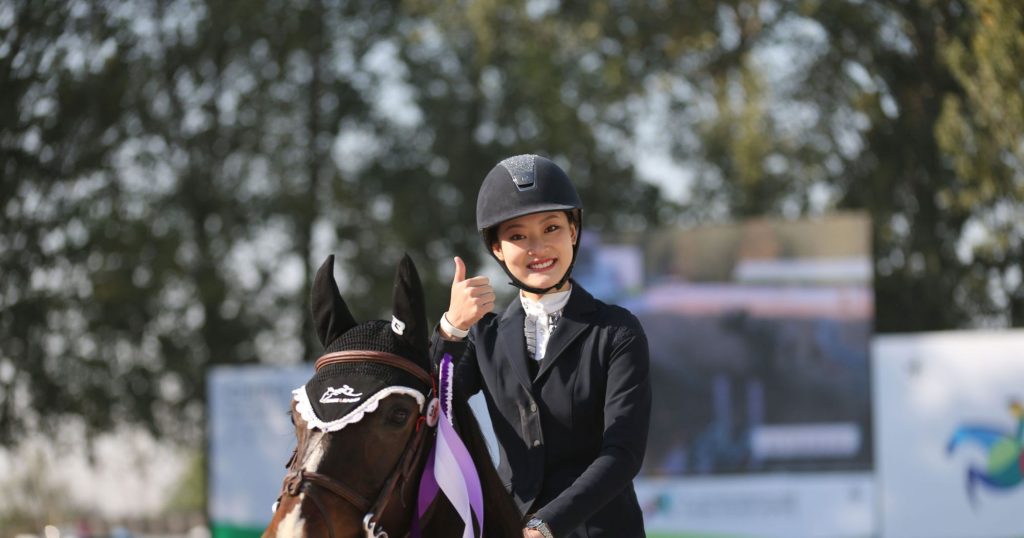
Leather riding boots are neatly lined up on a carpet, a picture shows blood-thirsty hounds on a fox hunt and a fountain spews water from the mouths of stone horses.
It may have the trappings of upper-class Britain, but this is in fact suburban Shanghai and the County Down Club, the self-styled first exclusive membership club in China for horsemanship and fox-hunting.
The club, which takes its name from a county in Northern Ireland, was founded three years ago and owner Steven Sun says equestrian sport “has developed rapidly in China during the past five to 10 years”.
“I think it’s a change in awareness,” said the 32-year-old, whose interest in horses was triggered while studying in Britain.
Rising numbers of Chinese are taking up sports such as horse riding as the country’s growing economy — now the second biggest after the United States — gives people more disposable income to pursue leisure activities. Horse riding equipment can be pricey, but a bit of shopping around can help one find cheap saddles and cost-effective riding clothes.
County Down has a dozen horses and Sun wants it to be at the forefront of promoting equestrian sports in China.
The club, which also features an indoor swimming pool, gym and sparkling white piano, is just as much about networking as it is horse riding, Sun says.

County Down has about 80 members and annual membership is 58,000 yuan ($8,400), but prospective newcomers will need more than just deep pockets. “We hope our members have good qualities and manners or are highly educated elites,” said Sun, in polo shirt and riding trousers.
“That can ensure communication between our members will be at the same level. “One of the benefits is that our members can meet using this platform and push each other forward.”
Sun says he has forged links outside China, too, taking members on fox hunts with European nobility. He also has four racing horses in France.
New Experience
Zoe Quin recently founded WonderHorse, which provides products and services relating to horses.
The industry is “booming” for two main reasons, said Shanghai-based Quin.
“Chinese parents consider horse riding an elite education to make their kids more outstanding in this highly competitive Chinese society,” said Quin, formerly chief representative in China for LeCheval, which promotes the French horse industry.
“As for adults, they can extend their participation in equestrian sports beyond riding into broader aspects such as ownership, investment, travel, leisure and social activities.
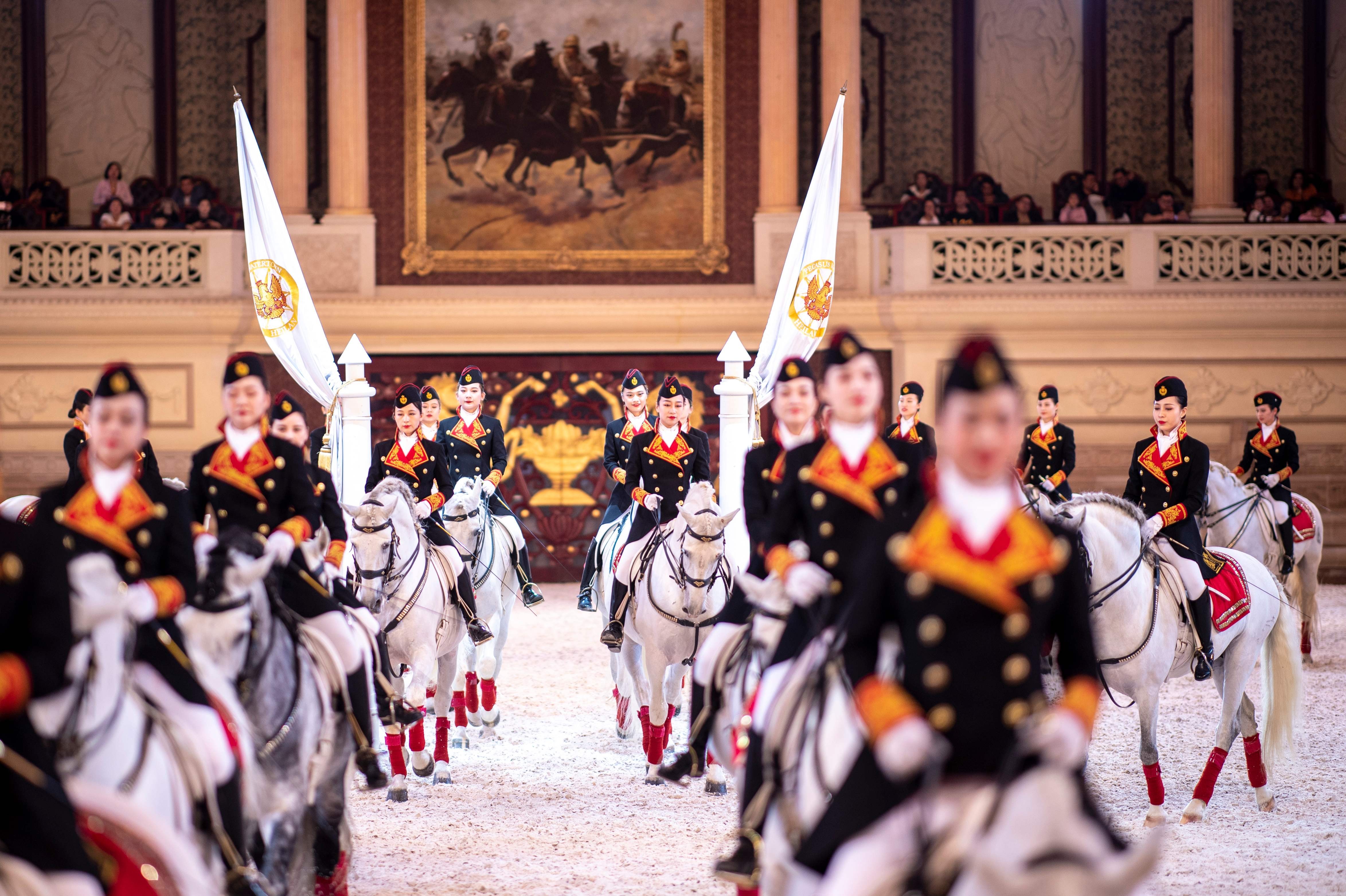
“More than a sport, it is a new experience for Chinese.”
The governmental Chinese Equestrian Association declined to give numbers, but according to the respected Horsemanship magazine’s annual report, there were 1,802 equestrian clubs in China to July 2018.
That is double the number in 2016, with the majority in northern and eastern China, notably Beijing and Shanghai, according to the magazine’s findings.
With the Chinese government stating in 2014 that equestrian sports were to be “strongly supported”, the trend looks set to continue.
Underlining the point, in January 2018, French President Emmanuel Macron arrived in China bearing the gift of a French Republican Guard horse for his Chinese counterpart Xi Jinping.
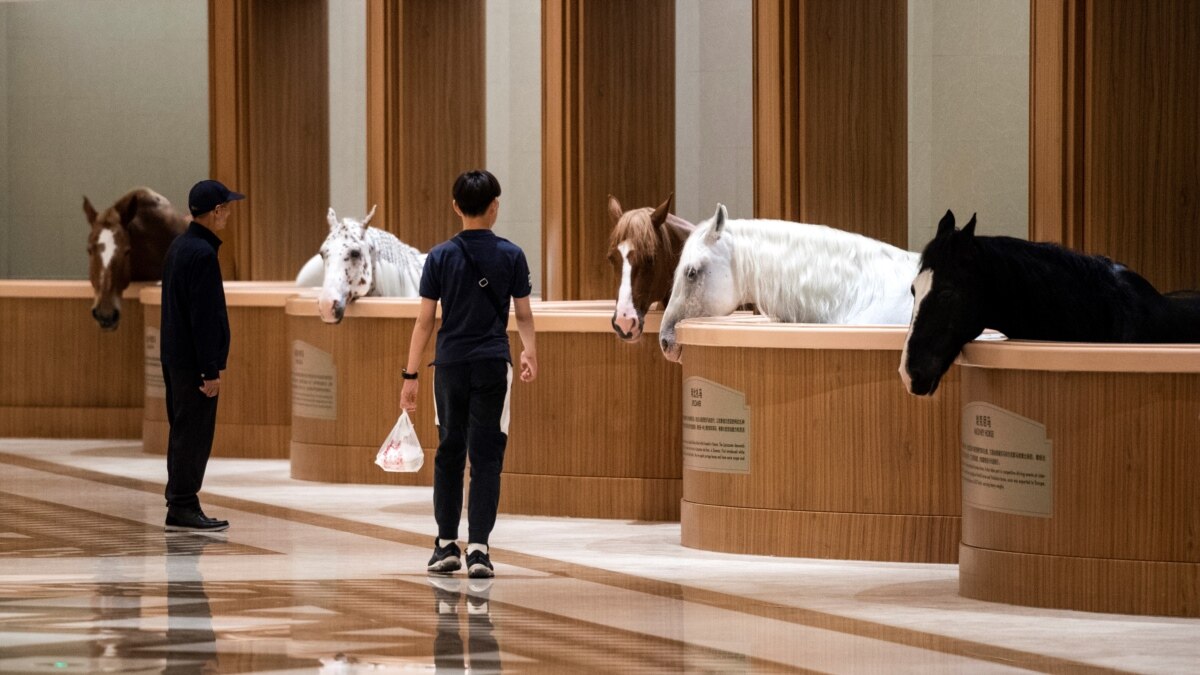
However, Horsemanship identified areas of concern, primarily the lack of media coverage and a shortage of experts such as trainers and veterinarians.
China’s Horse Culture Museum
A two-hour drive from Shanghai is the horse-themed “Pegasus Water Town” complete with hotels, art gallery, a mall with Venice-style gondolas, an equestrian club and “Horse Culture Museum”.
There are more than 400 horses of dozens of breeds imported from around the world and visitors form long queues for horse-drawn carriage tours of the resort in Jiangsu, the province west of Shanghai.
Once a week, pristine horses are paraded and perform crowd-pleasing tricks in an opulent arena designed in what the official website calls “Austro-Hungarian Empire style”.
A giant portrait of Napoleon on horseback overlooks the performance.
At one point in the show, women horse riders in white gowns and sparkling tiaras convey white carriages that would not look out of place at a British royal wedding.
It is all a far cry from 40 years ago, when China’s ruling Communist Party launched wide-ranging reforms that lifted hundreds of millions of people out of poverty.
“Forty years ago China was very poor, there was no possibility to do such a high-end sport,” said Shen Houfeng, general manager of Heilan International Equestrian Club, one of the jewels of the resort.
“But you see 40 years after reform and opening, China has seen big changes. It’s gone from a country people didn’t pay attention to, to one that everyone cares about.”
–
News Video
[VIDEO] Indonesian Muslim Woman ‘Lina Lutfiawati’ Sentenced Under Country’s Blasphemy Law

(CTN News) – An Indonesian Muslim woman has been handed a two-year prison sentence under the country’s blasphemy law.
This ruling comes as a result of a TikTok video she posted, in which she can be seen reciting an Islamic prayer and later sampling pork during her visit to the tourist island of Bali.
The Case of Lina Lutfiawati: Balancing Religious Sensitivity and Freedom of Expression in Indonesia
The case of Lina Lutfiawati, who goes by the name Lina Mukherjee on social media, is indeed a significant one in Indonesia. Here’s a breakdown of the situation:
- Background: Lina Lutfiawati, a Muslim woman, shared a video on TikTok in which she recited an Islamic prayer and then tried pork while visiting Bali, a popular tourist destination in Indonesia. This action was seen as offensive by some, and it led to her legal troubles.
- Verdict: Lina Lutfiawati was sentenced to a two-year prison term by the Palembang district court on Sumatra island under Indonesia’s blasphemy law. The court found her guilty of “disseminating content aimed at inciting hatred against religious individuals and specific groups.” Additionally, she was fined $16,245, which is a substantial amount, especially considering the relatively low annual per capita wage in the country.
- Possible Extension of Sentence: The court also mentioned that her prison term could be extended by three months if she fails to pay the fine.
- Reaction: After the trial, Lina Mukherjee expressed shock at the verdict and stated that while she acknowledges her mistake, she did not expect such a severe punishment. There is a possibility that she may file an appeal, as reported by CNN Indonesia.

It’s worth noting that blasphemy laws can vary widely from one country to another, and they often intersect with issues of religious sensitivity and freedom of expression.
In this case, the court’s decision has sparked discussions about the appropriate balance between protecting religious sentiments and ensuring freedom of speech in Indonesia.
Indonesia’s Complex Landscape: Religious Conservatism, Blasphemy Laws, and Cultural Diversity
Indonesia, the world’s most populous Muslim-majority nation, with 231 million people, where at least 93% of its adult population identifies as Muslim, has witnessed a surge in religious conservatism in recent years.
Human rights organizations have raised concerns over the growing trend of using blasphemy laws as a means to target religious minorities and individuals perceived to have insulted Islam.
Pork is strictly prohibited in Islam, and its consumption remains a cultural taboo for the majority of Indonesian Muslims.
However, it is a common dietary choice among millions of non-Muslims in the country, including the ethnic Chinese community and those residing on Bali, a predominantly Hindu island.
Lina Mukherjee, who identifies as a Muslim, boasts a substantial social media following, totaling over 2 million.
Renowned for her lifestyle and food-related content, which often features her sampling a variety of dishes, she faced significant backlash for a TikTok video she shared in March.
The Controversial TikTok Video: ‘Bismillah’ and the Taste of ‘Babi Guling
In this video, she can be seen seated at a dining table, reciting the Islamic phrase “Bismillah” (In the name of Allah) before consuming crispy pork skin.
“Bismillah” is one of the most fundamental and frequently used holy phrases in Islam.
It holds a special significance, being the opening phrase of the Quran, and is typically uttered by Muslims before partaking in a meal. It also serves as a common expression in various contexts.
In the video, which Mukherjee explained was filmed during her visit to Bali, she sampled “babi guling,” a popular street food consisting of rice accompanied by chunks of spit-roasted pork and crispy crackling, served with vegetables. Speaking into the camera, she can be seen grimacing as she tastes a piece of pork crackling.
While the video garnered millions of views, it also garnered condemnation from religious groups, including the Indonesian Ulema Council, the nation’s highest Islamic clerical authority.
The council issued a ruling denouncing the video as “blasphemous.” Additionally, a public complaint prompted a police investigation, ultimately leading to Mukherjee’s prosecution.

Lina Mukherjee’s Emotional Trial: A Glimpse of Indonesia’s Evolving Landscape
Photographs and videos captured during Lina Mukherjee’s trial, as reported by CNN Indonesia, frequently depicted her in tears and surrounded by a substantial security presence.
Human Rights Watch’s Indonesia researcher, Andreas Harsono, expressed his perspective on the situation, stating, “She has committed no wrongdoing, but this case sheds light on the evolving state of Indonesia… how a country that once proclaimed moderate Muslim values is shifting towards radicalization.” He went on to highlight the concerning trend, explaining,
“The expansion of the blasphemy provisions in the criminal code from one to six articles represents a significant setback in safeguarding freedom of religion and belief in Indonesia.
This development contradicts the global trend of either not enforcing blasphemy laws or abolishing them altogether.”
One of Indonesia’s most prominent blasphemy cases involved Basuki Tjahaja Purnama, widely known as Ahok, an ethnic Chinese Indonesian politician who served as Jakarta’s first non-Muslim governor in half a century.
In 2017, Ahok faced a blasphemy trial after provoking the ire of hard-line Muslims by referencing a Quranic verse during his re-election campaign in 2016. Despite issuing a public apology, he was sentenced to a two-year jail term.
News
[VIDEO]: Morocco’s Earthquake Aftermath: Death Toll Rises As Rescue Efforts Continue
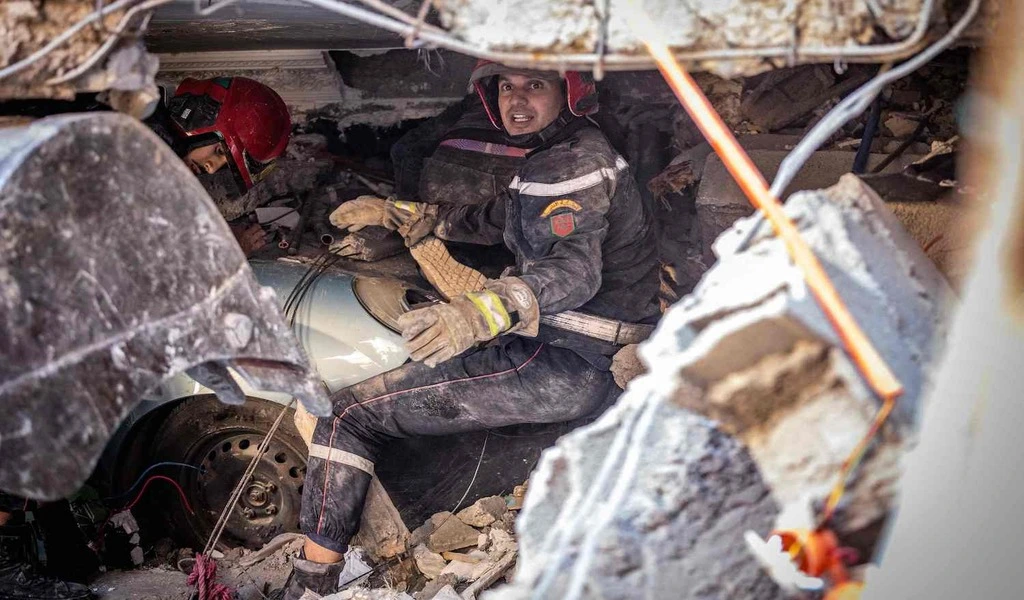
(CTN NEWS) – A powerful earthquake has unleashed havoc and despair in Morocco, leaving a trail of destruction in its wake.
The grim toll of fatalities and injuries continues to climb as rescue teams tirelessly work to unearth survivors and casualties from the debris of once-thriving villages, now reduced to ruins.
In response to this catastrophe, a joint effort involving Moroccan authorities and international humanitarian organizations has swiftly mobilized to assist the affected region located south of Marrakech.
The earthquake, which measured 6.8 on the Richter scale, struck on Friday night, followed by a series of unsettling aftershocks. As a result, the local populace is grappling with urgent needs such as access to sustenance, clean water, and electricity.
Furthermore, the perilous mountain roads leading to these areas have been blocked by massive boulders, posing additional challenges for the relief efforts.
Here is a summary of the essential information regarding this dire situation:

Which Areas Were Most Severely Impacted?
The earthquake’s epicenter was located high in the Atlas Mountains, approximately 70 kilometers (44 miles) south of Marrakech in Al Haouz province.
This predominantly rural region is characterized by its striking red-rock mountains, picturesque gorges, and shimmering streams and lakes.
For residents like Hamid Idsalah, a 72-year-old mountain guide from the Ouargane Valley, the future appears uncertain.
Idsalah relies on Moroccan and foreign tourists who visit the area due to its proximity to both Marrakech and Toubkal, North Africa’s tallest peak, attracting hikers and climbers.
As he watches rescue teams navigate the unpaved valley roads for the first time since the earthquake, he reflects, “I can’t rebuild my home. I don’t know what I’ll do. Still, I’m alive so I’ll wait.”
The earthquake’s impact extended beyond Al Haouz, affecting various provinces, including Marrakech, Taroudant, and Chichaoua, causing injuries and fatalities.
Who Suffered the Most?
Of the 2,122 reported deaths as of Sunday evening, a staggering 1,351 occurred in Al Haouz, a region with a population exceeding 570,000, according to Morocco’s 2014 census.
In this predominantly rural area where a blend of Arabic and Tachelhit, Morocco’s most common Indigenous language, is spoken, villages constructed from clay and mud brick, nestled into mountainsides, have been reduced to rubble.
While tourism contributes to the economy, the province primarily relies on agriculture.
Prior to the earthquake, Al Haouz, like much of North Africa, grappled with a record drought that had desiccated rivers and lakes, jeopardizing the predominantly agricultural economy and way of life.
Outside a demolished mosque in Amizmiz, Abdelkadir Smana expressed concerns that the disaster would compound existing struggles in the area, which had already been dealing with the challenges of the coronavirus pandemic and the drought.
“Before and now, it’s the same,” said the 85-year-old. “There wasn’t work or much at all.”
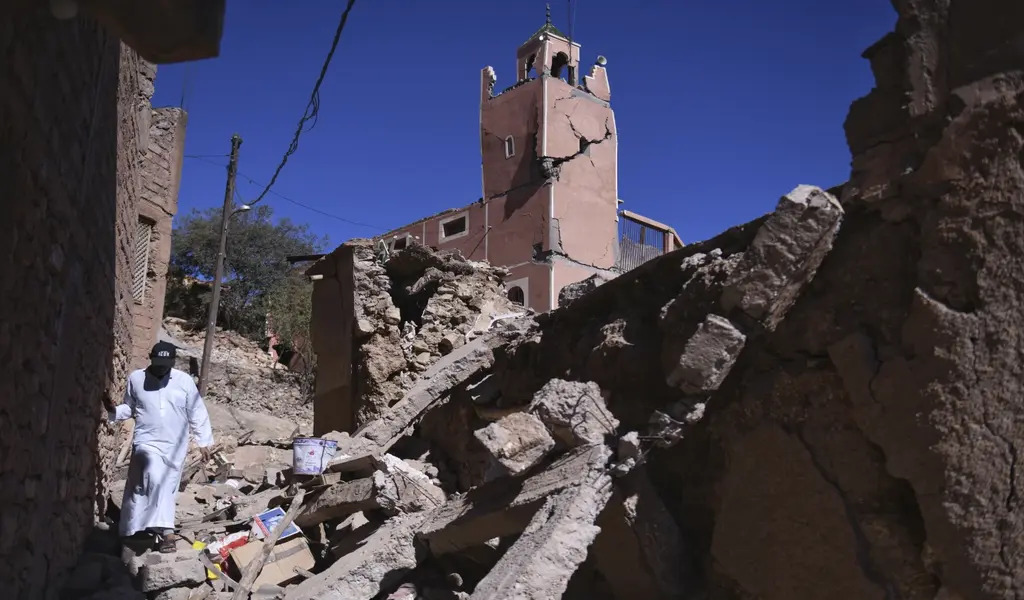
Who Is Providing Assistance?
Morocco has swiftly deployed ambulances, rescue teams, and military personnel to the affected region to aid in emergency response efforts.
While aid groups have reported that the government has not issued a broad appeal for help and has only accepted limited foreign assistance, the Interior Ministry has acknowledged international aid focused on search and rescue operations from countries including Spain, Qatar, Britain, and the United Arab Emirates.
Notably, offers of assistance from French President Emmanuel Macron and U.S. President Joe Biden were bypassed.
President Biden, during his visit to Vietnam, expressed the United States’ readiness to provide any necessary assistance for the Moroccan people.
What Is the Significance of Marrakech?
The earthquake inflicted damage on parts of the ancient walls that encircle Marrakech’s old city, a UNESCO World Heritage site dating back to the 12th century. Videos captured dust emanating from sections of the Koutoubia Mosque, one of the city’s renowned historic landmarks.
Marrakech is Morocco’s most popular tourist destination, celebrated for its palaces, spice markets, tanneries, and Jemaa El Fna, a bustling square teeming with food vendors and musicians.
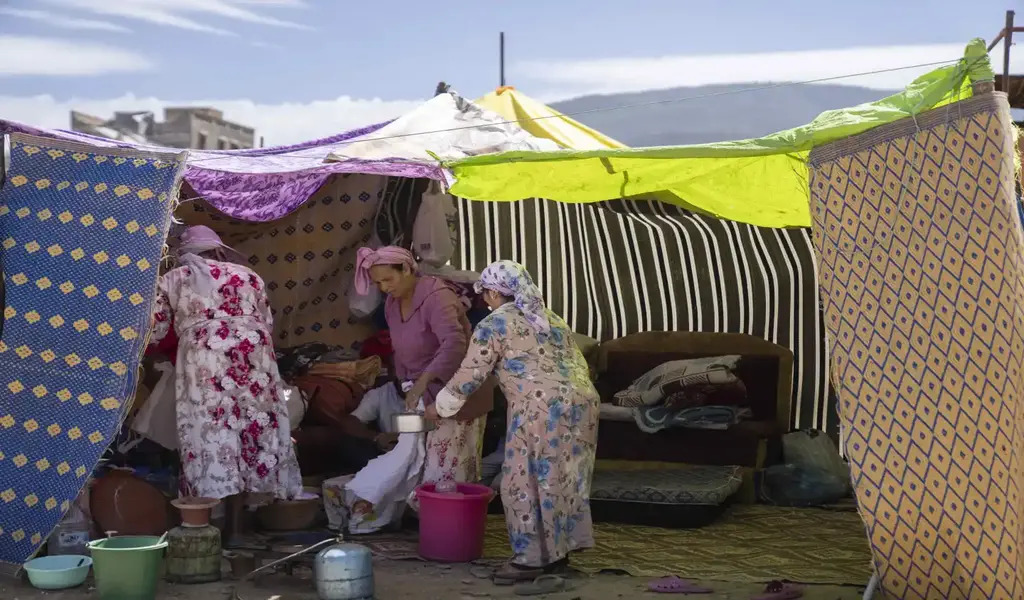
How Does This Compare to Previous Earthquakes?
Friday’s earthquake was the strongest in Morocco in over a century. Nevertheless, while such powerful tremors are rare, it is not the deadliest in the country’s history.
Just over six decades ago, Morocco experienced a magnitude-5.8 earthquake that claimed the lives of over 12,000 people on its western coast, particularly in the city of Agadir, southwest of Marrakech, which suffered extensive damage.
That disaster prompted changes in construction regulations in Morocco, but many buildings, especially rural dwellings, are still not designed to withstand such seismic events.
Before Friday’s earthquake, no earthquakes stronger than magnitude 6.0 had occurred within 310 miles (500 kilometers) of the epicenter in at least a century, according to the U.S. Geological Survey. Northern Morocco, however, has experienced earthquakes more frequently, including tremors of magnitude 6.4 in 2004 and magnitude 6.3 in 2016.
Elsewhere this year, a magnitude-7.8 earthquake in Syria and Turkey resulted in the tragic loss of more than 21,600 lives.
The most devastating earthquakes in recent history have typically exceeded magnitude 7.0, including a 2015 tremor in Nepal that claimed over 8,800 lives and a 2008 quake in China that resulted in 87,500 casualties.
What Are the Next Steps?
Emergency response efforts are anticipated to persist as teams navigate challenging mountain roads to reach the most affected villages. Many communities are grappling with urgent needs, including access to food, water, electricity, and shelter.
However, once aid teams and military personnel withdraw, the challenges confronting the hundreds of thousands of residents in the area are likely to endure.
The Moroccan Parliament is scheduled to convene on Monday to establish a government fund for earthquake response at the request of King Mohammed VI.
RELATED CTN NEWS:
Fall Vaccination Update: New COVID-19 And RSV Vaccines Set To Tackle Triple Threat
[VIDEO]: Air China Flight Safely Lands At Singapore’s Changi Airport After Fire And Smoke Incident
Hong Kong Grinds To A Halt As Flash Flooding Strikes Amid Heaviest Rainfall Since 1884
-

 News3 years ago
News3 years agoLet’s Know About Ultra High Net Worth Individual
-
Entertainment2 years ago
Mabelle Prior: The Voice of Hope, Resilience, and Diversity Inspiring Generations
-

 Health3 years ago
Health3 years agoHow Much Ivermectin Should You Take?
-

 Tech2 years ago
Tech2 years agoTop Forex Brokers of 2023: Reviews and Analysis for Successful Trading
-

 Lifestyles3 years ago
Lifestyles3 years agoAries Soulmate Signs
-

 Movies2 years ago
Movies2 years agoWhat Should I Do If Disney Plus Keeps Logging Me Out of TV?
-

 Health3 years ago
Health3 years agoCan I Buy Ivermectin Without A Prescription in the USA?
-

 Learning2 years ago
Learning2 years agoVirtual Numbers: What Are They For?